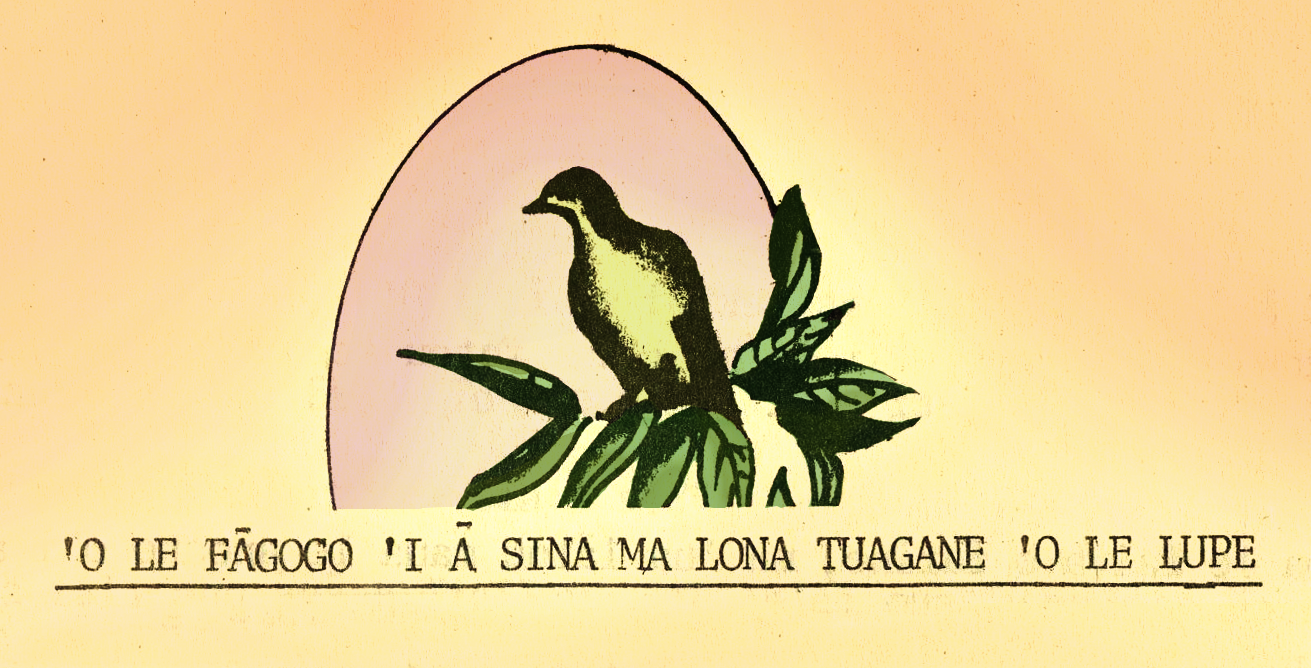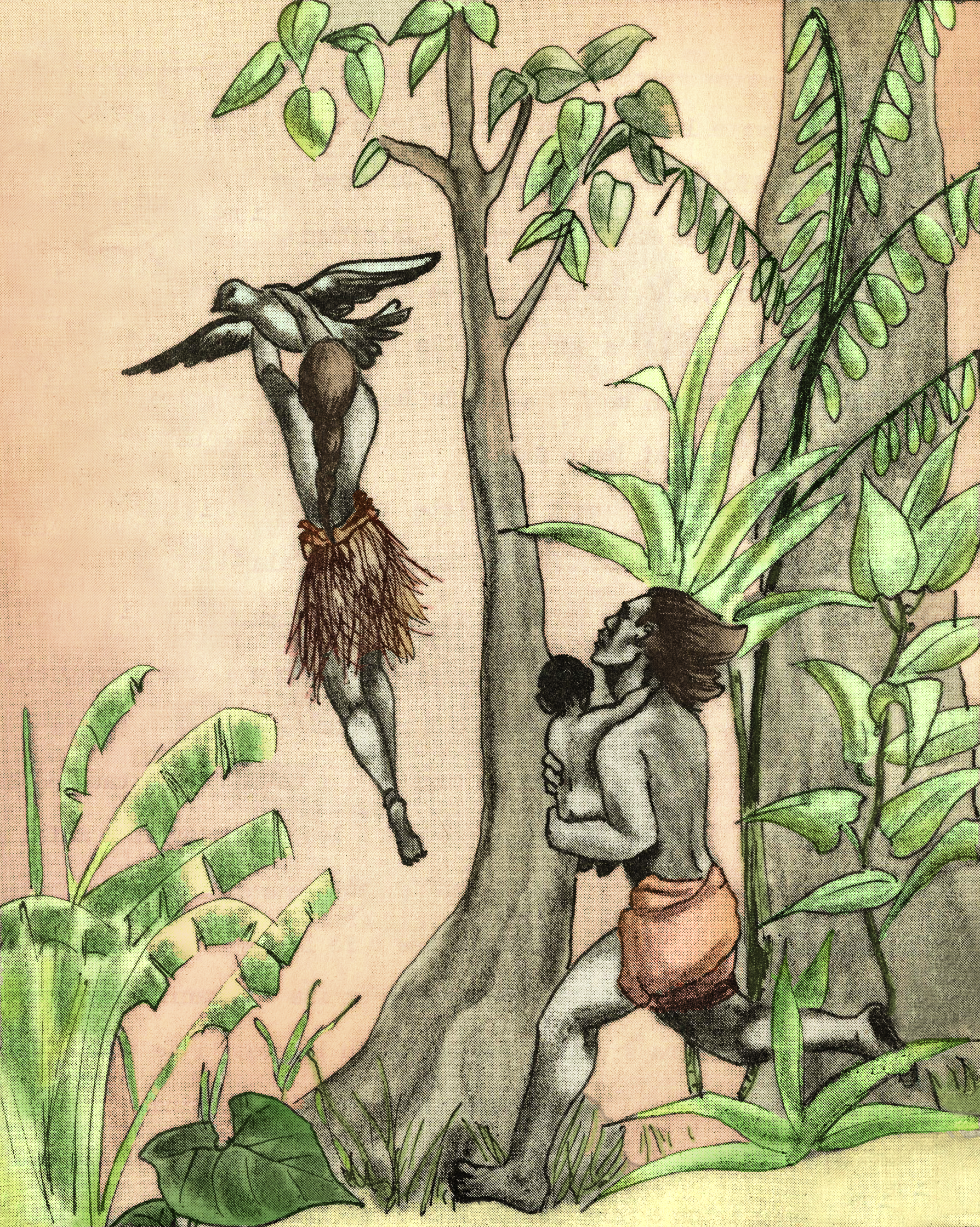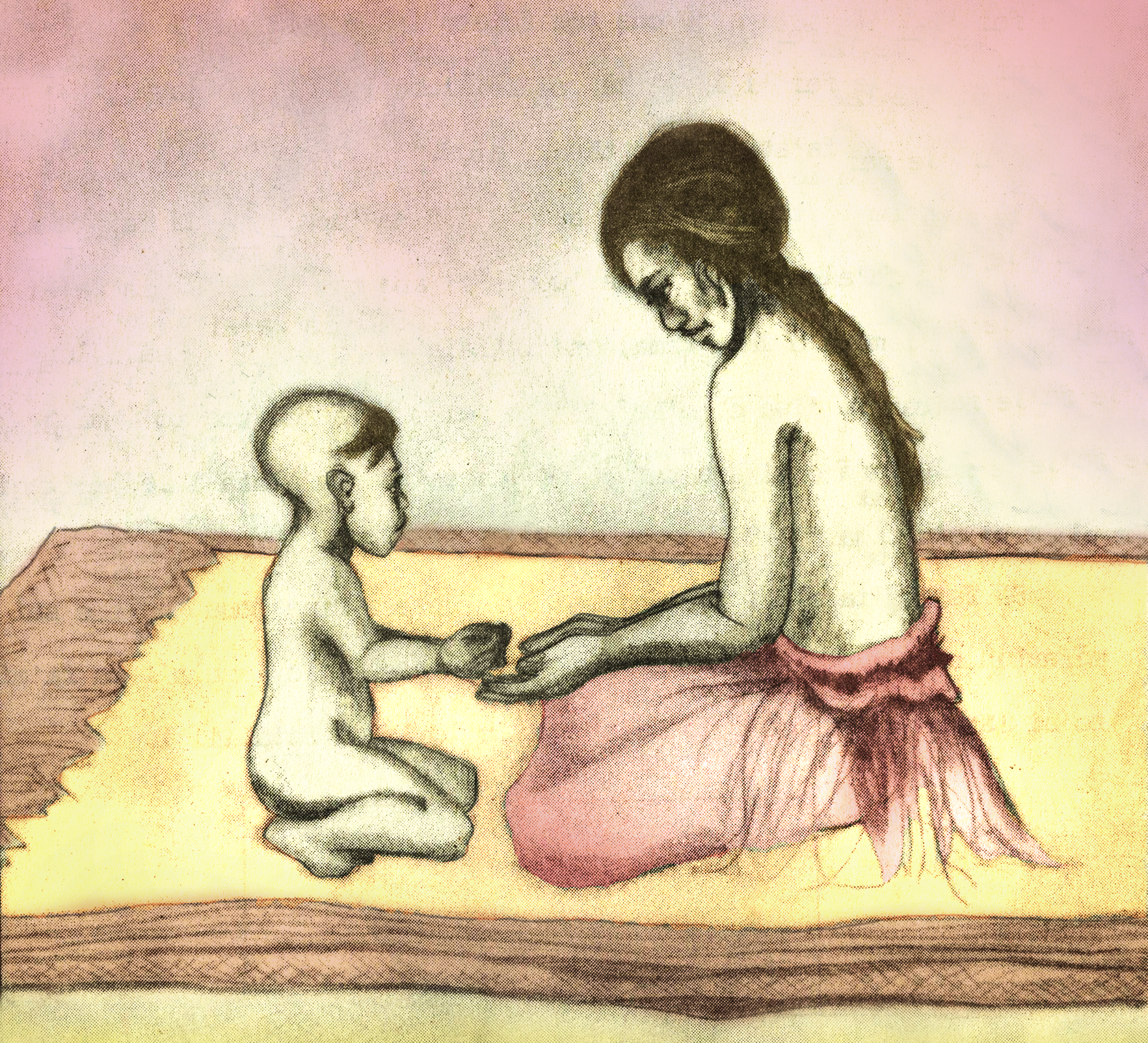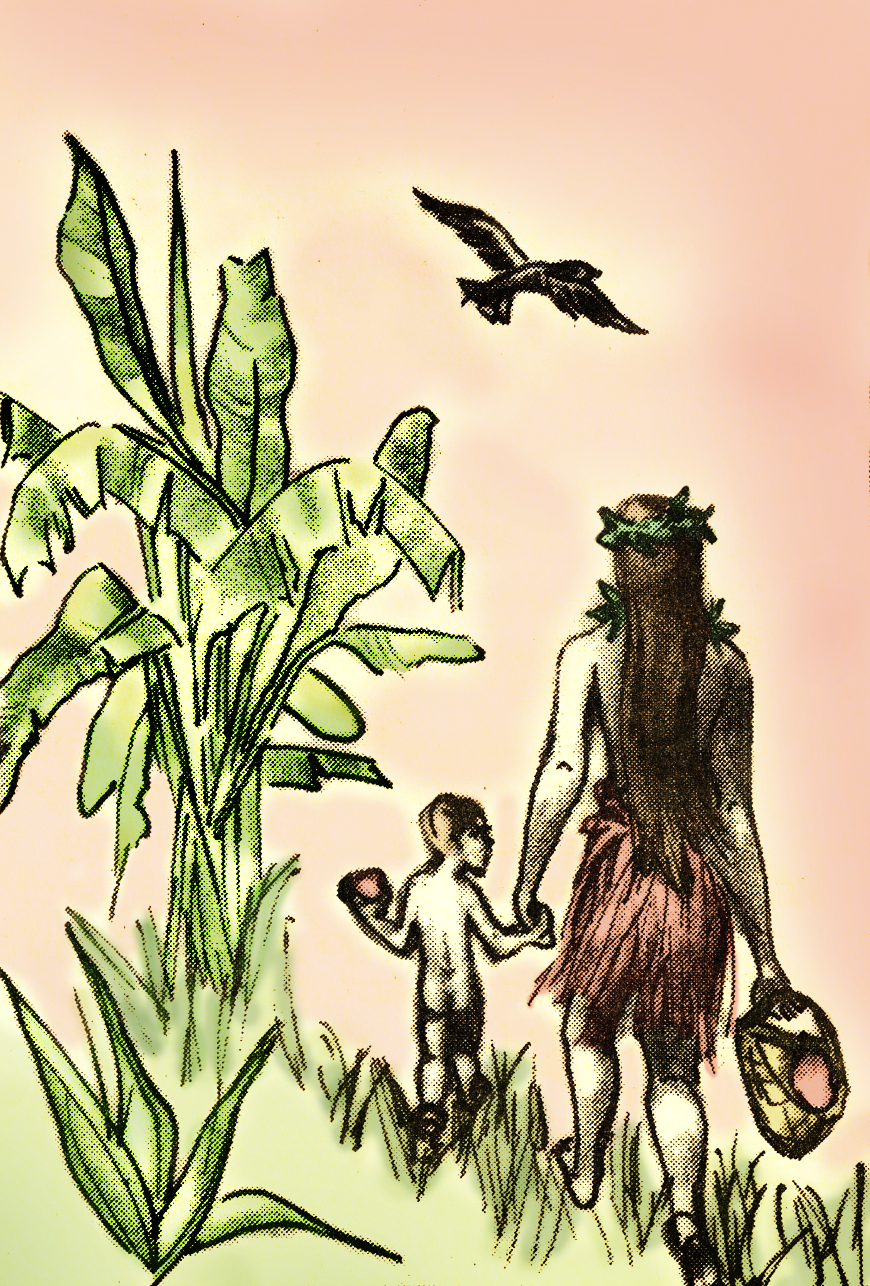
Na fānaua e le ulugāli’i ‘o Leue ma Fa’alaulaue le manulele lea ’o le lupe. ‘0 le lupe tāne le tama a le ulugāli’i. Na le fiafia le ulugāli’i ‘i le lā tama ona e le ’o se tagata. ’E le gata ‘i lenā, ’a e le aogā fo’i le lupe ’i se fe’au a le ’aiga. Na iloa e le lupe na uiga fa’asiasia o ona mātua, ona ita ai lea o le lupe ma teva ’i le vao. Na alu le lupe ’ua nofomau i le vaomatua ma asiasi fa’ananā *i ona mātua. Na asiasi ane lea lupe i le isi aso ma na iloa ai ’ua toe fānau lona tinā, ma ’o le teine lana taraa. Sa fiafia le lupe ‘ina ’ua maua sona tuafafine. ’A e maise, ’o le’ā feso’asoani lona tuafafine i le tausiga o lā mātua. ’O le mea lea na toe sola ai loa le lupe ma nofo i le vaomatua.
Sa fa’aigoa e le ulugāli’i le lā tama teine ’i ā Sina. Na ola malōlōina ma tupu ‘aulelei a*e le tama’ita’i ’o Sina. Ma ’o Sina lenei na fiar fa’aipoipo ’i le mānaia o Sāvavau e igoa ’i ā Tigilau. Ma na i’u lava ’ina fa’ataunu’uina lona mana’o, ma ’ua lā fa’aipoipo loa ma Tigilau. ‘A e pagā lea, sa ‘avea le lālelei o Sina ma māfua’aga ’ua feitai ma fuā ai isi āvā a Tigilau. Ma ’ua lātou taumafai ai ’i se ‘auala e tuli ‘ese ai Sina mai ‘ia Tigilau.

Sa alu loa le faiva o fafine, ma ’ua lātou maua le anoano o i’a, Sa lātou ‘aumaia nā i’a ma sao fa’atasi i le fale o lo lātou ali’i ‘o Tigilau. Na alu ane Tigilau ma va’ai ‘i ai i le tele o i’a, ona ia faiatu lea ‘i ana āvā, “Tu’u fa’alelei tatou i’a ‘i se nofoaga e malu lelei ai, se’ia aulia-taeao ona fa’asoa lea ma fai ai le tātou ‘aiga fiafia.”
Sa ō ane loa avā a Tigilau ’ua fu’e i’a ‘i ’ato ma ‘ave ua tautau i 1 talātua o le fale o lo ’o nonofo ai Tigilau ma Sina. Na o’o ‘i le valuāpō ina ’ua momoe gase Tigilau ma Sina, ona tolotolo ane lea o le isi āvā fa’a-taulāitu a Tigilau ’ua folo i’a ‘uma sa i totonu o ’ato, ‘a e tautau ai na ‘o atigi ’ato. ‘0 le ava lea a Tigilau, ‘e itulua. ’E iai Iona itū tagata ma Iona itū aitu. Ma ‘o le mea lea na ia mafai ai ona folo le anoano o i’a
sa i totonu o ’ato.
’Ua malama a’e le taeao, ona pisa lea o āvā a Tigilau po ‘o ai ’ua na gaoi ma ‘ai le anoano o i’a sa i totonu o ’ato. Sa alu ane Tigilau ma su’e-su’e ta’ito’atasi ana āvā ‘uma, ‘a e sa fa’afiti lātou ‘uma ma faiane,”Mātou te māsalosalo ‘i ā Sina, ‘auā ‘o le lua fale ma Sina lea na tautau ai ’ato i’a.”

ma fesili atu ’i ai, ”’0 le ā se fa’asalaga o le’a fai ’i ā Sina, ’auā ’ua leaga lana mea ’ua fai? Tou te mānana’o e fasioti Sina, pe tou te manana’o e momoli ’i le vaomatua e tia’i ai?”
Sa tali ane āvā a Tigilau, “‘E lelei ona ’ave Sina ’i le vaomatua e tia’i ai.”
Sa fa’atonu loa e Tigilau ana ’au’auna e to’alua e ō e momoli Sina ’i se mea mamao o le vaomatua e tia’i ai. Ma sā fa’apea lava ona faia e tusa ma le fa’atonuga a Tigilau. Peita’i, ’a ’o le’i ō a’e Sina ma ‘au’auna a Tigilau ’i le vaomatua, sa manatua e Sina, ’ua le toe tele ni aso ona ia fānau lea. ’O le mea lea na ia faiatu ai ’i le tasi ’au’auna, “Sole, alu e
fai ‘i ā Tigilau, ’ā iai lava ni ou alofa ’o totoe ‘i ā te a’u, ona ’aumai lea o se ’ie e fa’a’afu ai sia’u tama pe ’ā ‘ou fanau. Ma ‘aumai fo’i ma sina u’u e fa’au’u ai sia’u tama.”
Sa alu loa le ’au’auna. ’A e tālōfa e, sa tuli ’ese le ‘au’auna e le tasi āvā a Tigilau. Peita’i, ’a ’o faia nei mea leaga ’uma ’i ā Sina, ‘a ’o lo ’o lafi pea le lupe i luga o lā’au ma luga fo’i o talitali o fale, ma tilotilo ifo ‘i ai. Ma sā ia mulimuli atu fo’i ’i le mea o lo ’o ‘ave ’i ai lona tuafafine e ‘au’auna a Tigilau. Na lātou taunu’u’i le ‘ogātotonu o le togāvao, ona fau lea e ’au’auna le fale lauvao mā tia’i ai Sina, ’a e toe sōsola ifo lā’ua ‘i tai i le ’a’ai.

Lupe e, na ’ou sau,
Ma taunu’u ‘i Sāvavau,
Na maua ‘ato i’a,
Na tu’ua’iina ai fua ‘ita,
Faimai ‘ua ta ’aina,
Na ala ai ona mōlia mai ’ita,
’I lenei vaomatua sinasina.
‘Ā ‘ua ‘ou le iloa lava,
Po ‘o ai fafine taulia, ‘a ‘o ai fafine tulia?
Pe na ola e ā lea tama,
Pe fa’a’afu ma fa’au’u i ni ā?
‘ A ‘ua punitia ai le mata o le lā,
Lupe e, ta fiamou atu,
Ta fiaalu ‘i fanua le nanamu.
Ta fiaalu ta te moanoe solo,
‘E pei ‘o fafine ‘ua solasola o’o.
‘A e tu’u ia le tama a Tigilau.
‘Auā ‘ua sui lo’u māfaufau.
Na fa’alogo le lupe ‘i le tagi tālatāla a Iona tuafafine ‘o Sina, ona ia lele lea ‘i le ‘a’ai i le mea o lo ‘o iai Tigilau ma ana āvā. ‘E taunu’u atu le lupe o lo ‘o fasi e Tigilau lana āvā itūlua nā na ‘aia i’a, nā tu’ua’iina sese ai Sina. Sā lafi le lupe i le talitali o le fale ma fa’alogologo po ‘o le a le isi mea o le’ā fai e Tigilau. ‘A ‘o Tigilau ‘ua oso nei Iona alofa ‘i ā Sina, ma ‘ua ia sāuni loa e alu ‘i le vacmatua
e ‘a’ami Sina. Nā iloa e le lupe le mea ‘ua tupu, ona ia lele fa’ananā
a’e lea ma muamua loa ‘i le vacmatua ‘i le fale o Sina ma lana tama.
Na taunu’u le lupe ‘i uta, ona ia tū lea i le lā’au o lo ‘o i le lumāfale o Sina, ma fa’atali mai le taunu’u atu o Tigilau. Na taunu’u Tigilau ‘i le fale o Sina, ona fa’ate’ia lea’ona ‘o le tele o ‘ietoga o lo ‘o fau mai luma o le fale o Sina. Sā tū loa Tigilau ma tilotilo ifo ‘ i ana ‘ ietoga na ‘avatu e fa’a’afu ai le tama a Sina. Na toe tepa a’e ‘i luga Tigilau ma na iloa atu le tuagane o Sina o lo ‘o tū i luga o le lā’au, ona ia tagi lea, ma fa’apea ana ‘upu:
Lupe e, ‘ua ‘ou fa’atamala lava,
‘Ina ‘ua sui lou suafa,
Faimai fo’i ‘o ‘oe ‘o Sugaluopeamaivasa.
Lupe e, na ta sau nei ‘ita,
Ma nei ‘ie fuaiva,
‘ E- toe tuli mai ai Sina,
‘Auā le tama e moe nei,
Ne’i fai ma o’u māsei,
Ma fuatia ai ‘ita nei.

‘A ‘o nofo to’atasi Sina i Iona fale, sā ō ane ali’i ma tāne o
Sāvavau ‘ua aumoe ane ‘i ai. Ma ‘ua ‘avea lea ma ala ‘ua tumutumu ai le
fale c Sina i aso ‘uma. Na va’ai ma fa’alogo Tigilau i le tumutumu o
le fale o Sina i ana ta’a, ona ātili ai lea ona oso a’e Iona mana’o alofa ‘i ā Sina. Ma ‘ua le maua ai sana moe i pō ‘uma ‘i Iona māfaufau ‘i ā Sina. ‘E le gata ‘i lenā, ‘a ‘ua ia tagi fo’i i taimi ‘uma e tau ane ai
ona māfaufauga ‘i ā Sina. Ma ‘ua ia māfaufau loa ‘i se ‘auala e mafai ai
ona lā toe fa’atasi ma Sina. Ma na pau le ‘auala na sili ona tāua i le māfaufau o Tigilau, ‘o Iona ‘auina atu lea o le lā tama ‘i s Sina.
Sā tausi pea e Tigilau le tama se’ia o’o ‘ina ‘ua manino lana tautala, ma ‘ua mālosi fo’i lana savali. Ona ia faiatu loa lea ‘i le tama, “Sole,
sau ia e alu ma au fāsitalo ia e mama mai e lou tinā ‘o Sina.”
Sā alu loa le tama ma ana fāsitalo ‘ i le fale o Sina. Na alu atu
le tama ma nofo i tua o Sina, ma faiatu ‘i ai, “Mama a’u fāsitalo ia.”
Sā tilotilo ane Sina ‘i lana tama ‘ua matua, ona ia faiifo lea ‘i
ai, ” ‘Ā toe mama lava ia fāsitalo ‘ua ‘e matua, ‘ua ‘e lava fo’i ona ‘ai fāsitalo?”

Peita’i, sā musu lava le tama e ‘ai fāsitalo. Ma sā ia toe faiatu ‘i Iona tinā, “Se, mama a’u fasitalo, fa’amolanole.”
Sā tago ifo loa Sina ‘ua mama fasitalo a lana tama. Na ‘ uma ona mama fasitalo a le tama, ona momo’e lea o le tama ‘ua ‘ave ana lu’uga mama ‘i Iona tamā ‘o Tigilau. Sa tago atu Tigilau ‘ua folo ‘uma roāmā
talo na alu atu ma Iona atali’i.
Na o’o ‘ i le tasi aso, ona toe faiatu lea o Tigilau 1 i le tama, “Sole, sau ia inā alu e fai ‘ i lou tinā, pe le alofa lava ‘ i ou mata, ‘ a e sau ia tātou toe nonofo fa’atasi i lo tātou ‘aiga.”
Sā alu loa le tama ‘ua ta’u atu ’i ā Sina ‘upu ’urna na faiatu ai Tigilau. Na fa’alogo Sina ’i nā ’upu a si ana tama, ma ‘ua ia va’ai alofa fo’i ’i mata o lana tama, ona ia faiatu lea ‘i ali’i sā i Iona fale, “Ali’i e, cmai ia ‘inā ō. ‘Auā ’o a’u nei o le’ā ’ou toe fo’i mā be nonofo ma le tamā o si a’u tama. ‘E leaga ‘ua ’ou alofa i le tagitagi mai pea o si a’u tama.”
Sā fa’ate’ia ali’i na i totonu o le fale o Sina ‘ona ‘ua toe sui le
māfaufau o Sina. Ma ‘o le mea lea na tutu a’e ai le ‘auali’i ma fa’afe-to’ai lStou ulu ‘i pou o le fale ‘ona ‘o lo lātou fa’alili’i.
‘A ‘o Sina ma lana tama ‘ua toe o ane ma nonofo fa’atasi ma Tigilau.

Leue and Fa’alaulaue gave birth to the bird, the lupe (pigeon). The couple’s child was a male lupe. The couple was very unhappy with their new child because he wasn’t human, but even worse, the lupe was useless for family chores. The lupe was quite aware of his parents’ displeasure, and this angered him so much he ran away into the forest. He visited his parents only secretly. One day the lupe visited his parents and discovered that his mother had given birth again and her new child was a girl. The lupe was quite happy he finally had a sister, especially because his sister would help take care of their parents. For that reason, the lupe ran away again to live in the bush, since he did not need to worry about them any more.
The couple named their daughter Sina. She grew up to be a beautiful and healthy young woman. She was the same Sina who had wanted to marry the famous and handsome son of the chief in Savavau who was named Tigilau. While Sina got her wish and married Tigilau, his other wives soon became very jealous and angry about his favoritism, and they did everything possible to chase her away from Tigilau.
The difficulty began when Tigilau declared a special day of celebration, and instructed his wives to bring all their food so they could feast together. Tigilau said to them, “Later on this evening, let us all go fishing so that we will have plenty to eat tomorrow during the feast day.”
Tigilau’s other wives followed his instructions and went on the fishing trip, and returned with many fish, gathering these in the house of Tigilau. When he saw all the fish then he said to his wives, “Put the fish properly in the safe storage place so that they will keep until we cook them tomorrow for the big family feast.”
The wives of Tigilau then put the fish into baskets and took them and hung them in back of the house where Tigilau and Sina lived. Later at midnight when Tigilau and Sina were in a deep sleep, one of Tigilau’s wives who was an ‘ava fa’ataulaitu (part ghost), crawled over and devoured all the fish that were stored in the baskets. When she was done, she returned only the empty baskets. This particular wife of Tigilau had two natures, being one part human and the other part part spirit, or ghost. This gave her the ability to swallow this huge quantity of fish, unlike any human on earth.

In the morning the wives of Tigilau noticed that all the fish were missing, and they began grumbling about who had stolen all the fish that they had safely stored away the night before. Tigilau was also troubled by the disappearance, and questioned each of his wives to see if they had stolen the fish. Each in turn rejected both his inquiry and his accusations, saying, “We suspect Sina stole the fish, since, after all, we hung the baskets of fish in the house you share with her, and therefore she would be most able to do this.”
Tigilau was very sad that now he also suspected Sina. This was the first time something like this had happened since Sina had become his wife. She had never been accused before, and so, foolishly he believed the accusation. With a heavy heart, Tigilau then gathered all his wives together and questioned them asking, “What punishment should I inflict on Sina for this awful thing that she has done? Do you all want Sina to be killed, or do you want her to be sent to the forest? I could just leave her there?”
The wives of Tigilau answered in complete agreement. “It would be good to take Sina into the forest and abandon her there. There is no need to kill her if she is gone for good.”
Sadly, Tigilau ordered his two servants to take Sina far in the forest and leave her there, which they obeyed. But just before they set off to take Sina to the forest, she remembered that it would not be many days before she gave birth to the child she was expecting.
For this reason, she said to one of the servants, “Please tell Tigilau that if he has any love left for me, then he might bring an ‘ie to cover my dear child when I give birth. And bring also some oil to anoint this child.”

The servant left immediately to be of help, but the poor servant was chased away by one of the jealous wives of Tigilau, who would not permit her help. In the meantime, while so many cruelties were occurring, causing Sina great suffering, her brother the lupe had been hiding above the trees, peeking down and guarding the house where Sina awaited her banishment. When she was led away, he followed the servants of Tigilau to the place where his sister was to be abandoned in the forest. Once they had arrived in the middle of the forest, the servants built a modest house of grass and leaves and left Sina behind, while they returned home towards the village.
As Sina began her long and lonely life by herself in the forest, she did not know that her brother the lupe was guarding her every moment. When the day arrived that Sina gave birth, her brother the lupe flew down and perched on a tree in front of Sina’s house. The lupe opened his wings and cast shade over all of the land in front Sina’s house. When Sina saw the shade enveloping the front of her house, she ran out to see who it was. The lupe recognized his sister and began to shake off his colorful feathers. The feathers fell to the ground, and formed themselves into beautiful fine mats. When Sina saw the many fine mats that had been placed in front of her house, then she remembered the devoted brother her parents had told her about. When Sina recognized her brother the lupe, she cast herself down onto the ground and cried saying:
Lupe e, na ‘ou sau, (Pigeon, I came)
Ma taunu’u ‘i Savavau, (And arrived in Savavau)
Na maua ‘ato i’a, (They stole many baskets of fish)
Na tu’ua’iina ai fua ‘ita, (Which they blamed me for)
Faimai ‘ua ta ‘aina, (They said I took them)
Na ala ai on molia mai ‘ita, (And that’s why they brought me here)
‘I lenei vaomatua sinasina. (To this forest so white)
‘A ‘ua ‘ou le iloa lava, (But now I do not know)
Po ‘o ai fafine taulia, ‘a ‘o ai fafine tulia? (Which ladies are accepted or discarded?)
Pe na ola e a lea tama, (Why did this child of Tigilau live?)
Pe fa’a’afu ma fa’au’u i ni a? (What will I anoint and cover him with?)
‘A ‘ua punitia ai le mata o le la, (The sun’s eyes have blocked the light)
Lupe e, ta fiamou atu (Lupe, my Brother, I am too tired and I want to)
Ta fiaalu ‘i fanua le nanamu. (Go to land with no fragrance)
Ta fiaalu ta te moemoe sole, (I could sleep anywhere)
‘E pei ‘o fafine ‘ua solasola o’o. (Like the ladies who run away)
‘A e tu’u ia le tama a Tigilau. (But Please save Tigilau’s child)
‘Aua ‘ua sui lo’u mafafau. (Because I changed my mind for only him.)
The lupe heard the cries of his sister Sina so he flew down to the village where Tigilau and his wives were. When the lupe landed, he found that Tigilau was in a terrible state, since he had just discovered who had stolen and eaten the fish, and who had wrongfully blamed Sina. He was enraged, and beating her for her cruelty. The lupe hid in front of the house and listened to learn what else Tigilau would do.

As Tigilau’s regret about Sina began to swell and grow, his love grew for her returned, and so he prepared to go to the forest to fetch her back to him. The lupe knew what had happened so he secretly flew first to the forest to Sina’s and her son’s house. The lupe arrived inland and perched on the tree in front of Sina’s house and waited for Tigilau’s arrival. When Tigilau arrived at Sina’s house he was shocked to see the many fine mats piled in front of Sina’s house. Tigilau then looked at the fine mats he had brought with him to cover Sina’s son. He gazed upwards and recognized Sina’s brother perched above on the tree, and then he cried saying:
Lupe e, ‘ua ‘ou fa’atamala lava, (Pigeon, I have been careless!)
‘Ina ‘ua sui lou suafa, (Because they changed your name)
Faimai fo’i ‘o ‘oe ‘o Sugaluopeamaivasa. (They said you are Sugaluopeamaivasa)
Ma nei ‘ie fuaiva, (With these fine mats as offerings)
‘E toe tuli mai ai Sina, (To catch up with Sina)
‘Aua le tama e moe nei, (Because of the boy, my son, who is sleeping here)
Ne’i fai ma o’u masei, (Before I face misfortune)
Ma fuatia ai ‘ita nei. (And get punished for it)
After Tigilau had explained himself in great sorrow for what he had done, the lupe flew down and lifted up his sister Sina to fly her away to safety, leaving her child behind, as she had asked. Tigilau ran after him, lifting up the child, to follow the lupe as he carried Sina off. Tigilau kept running and called after the lupe and Sina to come down. However, the lupe kept flying away, taking his sister Sina to safety and away from his violence. Tigilau desperately ran after them, carrying the child, until he could no longer see the lupe and Sina. Having finally lost them, he returned with the boy to his village. But the lupe and Sina flew to the other side of Savavau where the lupe built a house for Sina. After the house was finished, Sina lived there.

As Sina lived by herself in her house, some chiefs and husbands came from Savavau and slept there. This was one reason Sina’s house was always full every day. Tigilau saw and heard that Sina’s house was always full of men or suitors, and he became jealous and more and more desirous for Sina. He could not sleep at night because of his thoughts of her. He became inconsolable, and cried all the time when he thought of Sina. He struggled to find a way that he could be together with Sina again. Finally he determined that the only way he could convince Sina to return would be to send their son to her.
Tigilau continued to care for the boy until he could speak clearly and was strong enough to make the journey to his mother. Then he said to the boy, “My son, go and bring these pieces of taro for your mother Sina to chew for you.”
The boy went with his slices of taro to Sina’s house. The boy went and sat behind Sina and said, “Mama, here are my pieces of taro.”
Sina looked at her child who had grown so much and then said to him, “Why should I chew these taro for you? You have grown and can chew these taro on your own!”
However the boy refused to eat the taro slices. He then said again to his mother, “Please mama, my slices of taro, do this for me, please.”

Sina grabbed her child’s slices of taro and started to chew. When she had finished chewing her sons slices of taro, then the boy ran and took his piles of chewed taro to his father Tigilau. Tigilau took it and swallowed all the chewed taro that his son had given him.
One day Tigilau again said to his son, “Please go and tell your mother if she has any pity in her eyes, she must come and let us live together again as a family.”
The boy went and repeated to Sina every word Tigilau had said. Sina heard the words of her son and she saw love in his face, so she told the men who were at her house, “Men, it is now time for you to get ready to leave because I will return and live together with the father of my son. I feel anguish for my dear son crying that we are apart for so long.”
The men in Sina’s house were shocked because Sina had changed her mind. For this reason, all the men stood and banged their heads on the poles of the house out of anger and frustration that she was leaving. But Sina and her son went back to live together with Tigilau.
Comments are closed here.